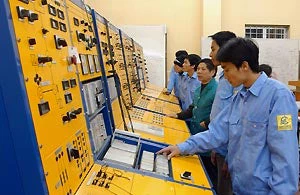
Last month, we asked you for your views about whether Vietnam’s workforce is ready for the future, "from rice to robots". Developing a skilled workforce for an industrialized economy by 2020 is one of the stated top priorities of Vietnam, now that it has joined the ranks of middle-income countries. Not surprisingly, education reform was on the minds of members of the Central Committee of the Communist Party during a recent meeting. However, education is also hotly debated by Vietnam’s citizens as seen and heard in an online discussion on human resource development, organized by the World Bank and VietNamNet, a local online newspaper, and by readers of our blog.
VietNamNet reader Nguyễn Văn Hưng summarized what was on many readers' minds, asking what the criteria for a high quality labor force are. Put differently, which skills does Vietnam's workforce need today and over the coming decade? In seeking answers to these questions, I propose to start by talking to employers now to listen what they have to say.
The World Bank together with the Central Institute of Economic Management (CIEM), one of Vietnam’s top think tanks, recently conducted a survey of 350 manufacturing and service sector firms in Hanoi and HCMC and surrounding provinces. It focused on understanding what employers think about the skills of their current workforce and what skills they are looking for.
Critical thinking, communication, team work
The results are not what you might think. First of all, employers say they are not happy with the quality of education and the skills of the available workforce, in particular its engineers and technicians. The dissatisfaction is especially pronounced among those businesses that are expected to carry Vietnam's transition to an advanced industrialized economy: its innovative and exporting firms.
Second, employers say they are not just looking for technical skills, such as the practical ability of an electrician to do the job. They are equally looking for what experts call "cognitive" and "social", or "behavioral", skills. For example, next to job-specific technical skills, critical thinking comes out as the most desired skill for white collar workers, followed by problem-solving, leadership and communication skills. Team work and problem-solving skills are considered important for blue collar workers. These findings are consistent with the opinions of many readers, like Barbara Shaw Miller who commented on our previous blog that there is a need to encourage critical thinking.
What does this mean for education reform?
These findings tell us three important things. First, a skills strategy for Vietnam should not just look at technical and vocational education and training (TVET) and university education. Critical thinking skills or team work are learned much earlier - in preschool, primary and secondary education. Yes, TVET and universities need to provide technicians and engineers with the theoretical and practical skills they need in their jobs – and many schools and universities in Vietnam can do better. But that is not enough. What young people learn, or fail to learn, in general education is just as important to employers.
Second, employers have a message for teachers and principals in primary and secondary schools. Critical thinking, problem-solving and communication skills are not acquired though rote learning where the teacher lectures and pupils copy – still the reality in many Vietnamese schools. If Vietnam's education system is to deliver the skills that employers want, the method of instruction will need to change.
Third, the views by Vietnamese employers are very similar to those of employers in much more advanced middle and high income economies. Talk to employers in any industrial sector in England or Germany: They will tell you that critical thinking and communication skills among workers are also in high demand but lacking. This means that by reorienting its education system to focus more on teaching these types of skills, Vietnam can prepare itself to deliver skills that will never go out of fashion and are important in almost any industry.
VietNamNet reader M Đồng asked what strategy for skills development Vietnam should adopt as it transitions from an agricultural to an industrialized economy. This question recognizes that in Vietnam today many workers are still employed in agriculture. Also, Vietnam’s abundant and relatively cheap labor may still be its comparative advantage in manufacturing.
So is now the right time to focus on skills for an industrialized economy? Absolutely. Vietnam's economy and that of its neighbors and competitors are changing fast. Already there is talk that China's days as the world's factory for low-cost products may be counted. Rising wages across countries in South-East Asia signal that low cost, low skill jobs may be lost faster than building a workforce that is educated and trained for high tech jobs. As our blog reader Phasina argues, if Vietnam wants to be ahead of the curve, it is right in preparing to act now.
Where to start?
Many readers asked where to start in improving the skills of the workforce? What should education reform focus on now? Education reform is unlikely to be successful if it is set by directive by government officials. Experience from around the world suggests that the fundamental education reforms that are needed to prepare the Vietnamese workforce for the future require an open discussion in society, involving businesses, schools and universities, parents and students and the authorities at different levels. That discussion needs to start with a forum for employers to communicate what they are looking for - and to ensure that everyone gets the message: critical thinking, communication and teamwork are the skills of the future.


Join the Conversation